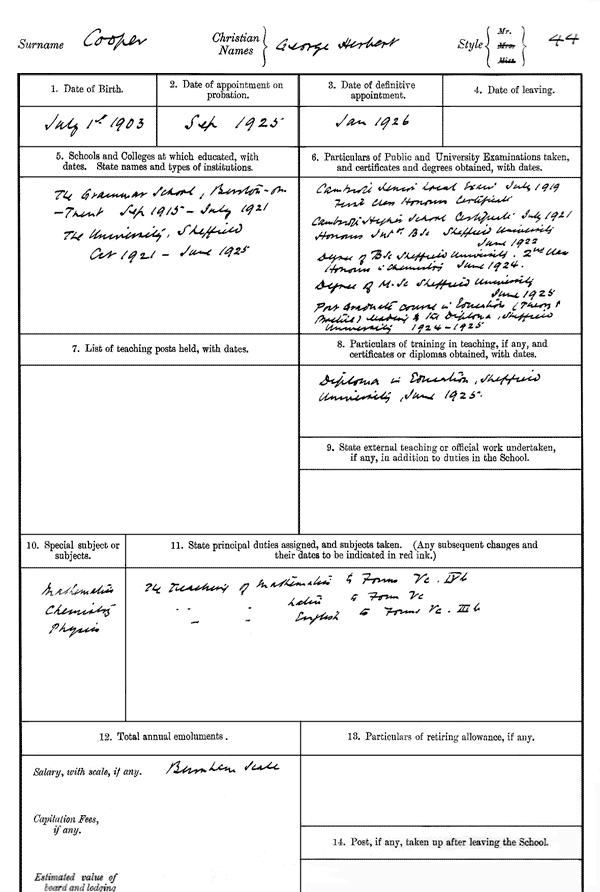George Cooper
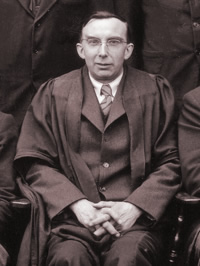 In 1915, while the First World War was raging, George Herbert Cooper joined Burton Grammar School as one of a small number of Scholarship boys who had performed sufficiently well in an application test to avoid having to pay the then relatively hefty fees.
In 1915, while the First World War was raging, George Herbert Cooper joined Burton Grammar School as one of a small number of Scholarship boys who had performed sufficiently well in an application test to avoid having to pay the then relatively hefty fees.
He performed very well at the school and was known for being methodically hard working which awarded him excellent examination results. After completing his Higher School Certificates in the sixth form, he left in 1921 for a place at Sheffield University to read Chemistry. In 1924, he gained a B.Sc and went on to take an M.Sc and Diploma in Education, again, both at Sheffield University.
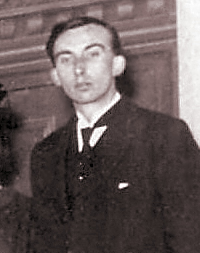 George was extremely pleased at being able to secure a teaching post back at Burton Grammar School. He was appointed by the headmaster of the time, R.T.Robinson, who was very familiar with him having been the headmaster there for the whole of his time there as a pupil. I think even Mr Cooper would have been amazed to know at the time that he would go on to spend the next 42 years at the school in a career that would span no less than seven different headmasters. After a short probationary period from September 1925, he was formally appointed in January 1926. Despite his main speciality being Chemistry, staff requirements required him to initially teach a combination of Mathematics, Latin and English. As the teaching staff grew, his sole teaching subject became Maths.
George was extremely pleased at being able to secure a teaching post back at Burton Grammar School. He was appointed by the headmaster of the time, R.T.Robinson, who was very familiar with him having been the headmaster there for the whole of his time there as a pupil. I think even Mr Cooper would have been amazed to know at the time that he would go on to spend the next 42 years at the school in a career that would span no less than seven different headmasters. After a short probationary period from September 1925, he was formally appointed in January 1926. Despite his main speciality being Chemistry, staff requirements required him to initially teach a combination of Mathematics, Latin and English. As the teaching staff grew, his sole teaching subject became Maths.
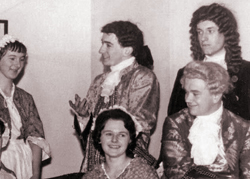 George was interested in Drama whilst a pupil and, after the founding of the Burton Grammar School Dramatics Society in 1920, he appeared as one of the cast of its very first production, ‘Jedbury Junior’, where he played ‘Whimper’, manservant to the Jedburys. On his return as a master, he keenly became involved again and became assistant director to Mr E.C. Nicholson, and later took over the business management of the society as well as taking on a number of roles in its productions over the years.
George was interested in Drama whilst a pupil and, after the founding of the Burton Grammar School Dramatics Society in 1920, he appeared as one of the cast of its very first production, ‘Jedbury Junior’, where he played ‘Whimper’, manservant to the Jedburys. On his return as a master, he keenly became involved again and became assistant director to Mr E.C. Nicholson, and later took over the business management of the society as well as taking on a number of roles in its productions over the years.
Mr Cooper became known as ‘Black Hawk’ because of his stooped demeanour and rather jerky walk, usually in his robes, that characterized him. In the transition from the Bond Street to Winshill schools, for some reason, he instead became known as ‘Judder’.
In 1950, George became ‘Second Master’ to Horace Pitchford, qualifying by virtue of intimate and long experience of the running of the School. He was hold this position until his retirement some 18 years later whereupon, Geoffrey Henton took over and the post was changed to ‘Deputy Headmaster’.
Although still a member of staff, George was appointed President of the Old Boys’ Association for 1952/3.
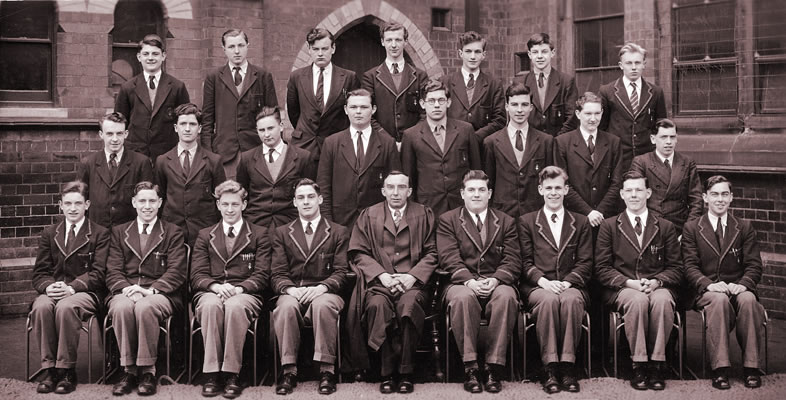 When Bill Gillion, a Cambridge Graduate of Mathematics and strong advocate of academic excellence, joined the school as Headmaster, he had plans of improving academic success of the most talented students and, in particular, to prepare them for scholarships for Oxford, Cambridge and other Universities of Excellence. It was his opinion that the Mathematics Department at the school, headed by a methodical but not particularly dynamic or progressive thinking George Cooper, did not offer sufficient provision so he took the tough decision in 1958 to re-appoint Harry ‘Brab’ Smith to take over. George was to retain a position as a Maths teacher to the lower forms but also retained the position of ‘Second Master’.
When Bill Gillion, a Cambridge Graduate of Mathematics and strong advocate of academic excellence, joined the school as Headmaster, he had plans of improving academic success of the most talented students and, in particular, to prepare them for scholarships for Oxford, Cambridge and other Universities of Excellence. It was his opinion that the Mathematics Department at the school, headed by a methodical but not particularly dynamic or progressive thinking George Cooper, did not offer sufficient provision so he took the tough decision in 1958 to re-appoint Harry ‘Brab’ Smith to take over. George was to retain a position as a Maths teacher to the lower forms but also retained the position of ‘Second Master’.
Outside of the school, George was very involved with the Methodist Church where, among other things, he was organist. He was also an enthusiastic member of the Burton Historical and Archaeological Society.
George H. Cooper lived for Burton Grammar School. He was rather unobtrusive meaning that much of his effect on the School went largely unnoticed. He worked quietly away without getting or seeking much acknowledgement. After his eventual retirement in 1968, he maintained his association with the School through his continued membership of the Old Boys’ Association.
Retirement Dinner, Newton Park Hotel 1969
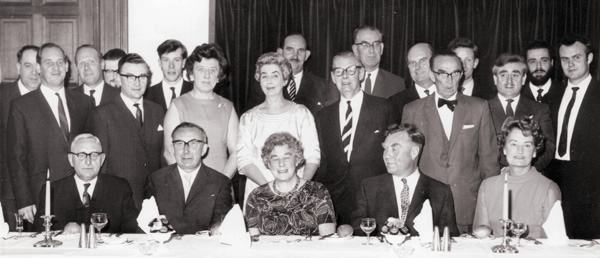
Standing: Percy Barratt, Geoff Henton, Jack Playll, Robin Langton, Hugh Wood, Richard Inwood, Mrs. Adams, Mrs. Read, Harry Smith, Frank Read, Jack Adams, K.T. Harris, David Davies, David Shrubbs, Norman Roe, John Redmond, Alan White
Seated: Horace Pitchford, George Cooper, Mrs. Cooper, Bill Gillion, Frances Gillion
Entry in Staff Book
